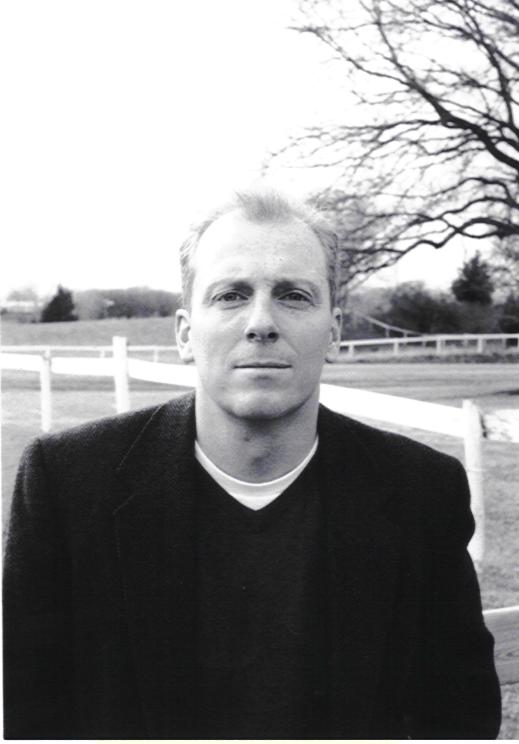 ____
____
William Sheldon____________Retrieving
Old Bones
My Kansas author for the month of July, 2002, is William Sheldon, who has just published a book of poetry, Retrieving Old Bones, with the Woodley Press. Bill lives with his family in Hutchinson, Kansas, where he teaches writing and literature at Hutchinson Community College. He is also a member of the Board of Directors of the Woodley Press, and was the editor of Donald Levering's Horsetail (featured on this page in February),when we published that book of poetry two years ago.
 ____
____
William Sheldon____________Retrieving
Old Bones
The Foreword to the book is written by Bill's long-time friend and colleague, Steven Hind, a fellow poet, whose In a Place With No Map was featured on this page in November of last year. Steve particularly praises Bill for being able to capture a sense of place, which is high praise, for that is what many most commend Steven Hind himself for being able to do.
I offer, as an example of the poetry, first, the title poem:"If you don't know where you are, you don't know who you are," says Wendell Berry. With the so-called "globalization" of the planet diluting our sense of place so that anywhere feels increasingly like anywhere else, the sensibility which can record with forceful immediacy the particulars of a time and place serves as antidote to the dilution of self-discovery. Coupled with the patronization generally granted to the Great Plains by more liberally watered and amply populated portions of this continent, that dilution makes precious those voices capable of extracting from this wide and spacious place its authentic identity. Thus do people have a chance to understand the character of their place, both in how that character can fail and cripple self-discovery, and in how it fosters an enabling intelligence.
To put this notion more simply, the voice of this book is of this place in the best sense. There is no cause for indictment when outsiders come into a place, appreciate its happy particularities and celebrate them. Yet whatever expression those voices achieve, they have not had available to them, for better and for worse, the formative experience which provides both a certain imprimatur of personality and a subsequent struggle of judgment which scars and tempers the native's achievement of full consciousness. In other words, the outsider's objectivity is an efficient winnowing tool allowing an ease of dismissal, a luxury which the native can possess only through a process of alienation from part of what makes him who he is. For that native, the reflection on experience is fraught with anguish as his sensibility and sophistication can make the occasional lunacy of his own folk ways a wrenching disassociation from once-acceptable elements of the self.
Bill Sheldon is such a native, schooled in the craft of his art by that universalizing process the university, yet possessed of a bedrock sensibility which, while not at odds with his training, often lies outside of its intentions, so there is a continual slipping through the fences between then and now, between practical savagery and aspiring self-awareness. So, one might say, in the vernacular, you can get above yur raisin' but yur gonna stand on its ghosts, all the same.
There is in many of these poems a sensibility performing its own memory of the collisions between selves, working toward a hopeful, wry, sometimes self-mocking synthesis of experiences, the kind of indigenous schizophrenia that in a category called 'poets,' makes every mother's son of us out here a hybrid of modern literacy, plains-puritan pragmatism, and coyote cunning. In this sense, Bill Sheldon's collection offers reassurance for the tentative native on a similar journey and insight for the literate outsider, for herein a true guide makes his record of true moments, fully realized through the actions of his art.
As to the kind of "introduction" which provides a reader's guide to what follows it, what you see is what you get. And what you get should make you value any path to maturity, lucky for its undiluted realities, with its own beautiful, gut-wrenching, anguished, pulsating demarcations of passage.Steven Hind
And then, because I can't resist, one of his Father's Bedtime Stories:Retrieving Old BonesThe lightning drives him
upstairs
where his bad teeth
deny my dreams.
I wake to his black bulk wedged
beneath the bed frame
to drag him down
sixteen stairs,
each an agony
for his crippled hips.Two weeks later,
gone for days,
the pound will call.
"Over the fence," they'll say.
A Springer bitch. Her
owner hot. And again,
it will cost me
more than his price
to drag him home.Almost drowned him once
on a winged mallard
out deep enough I
nearly filled my waders
dragging him in to wait
for the drake to sicken
and drift to shore."He always ranged a bit,"
my neighbor says,
sighting him once
on the shoulder
of the by-pass
dragging a chunk of limestone,
and once head high
with an antler
retrieved
fresh from some garage.So we are not surprised,
after a week of dragging
himself to water,
to find him gone. But the pound
doesn't hold him. And no
body. My father tells me
he's heard a Lab
will find a pond
and hold himself
under
as long as it takes.
The book can be ordered, for $7.00, plus $1.50 postage, from the author at:II. GrizzlySummer-ranger told me
the two who were left half-fell
from that damn jack pine
like bad fruit.
Said he watched
them pick through damp cloth.One boy said they'd left
the trail.
Woke that night
to his snuffling.
Fought out of their bags
and climbed.The other boy said he'd pressed
his face bloody against the bark
trying not to hear her . . ."It's eating me!"
He kept saying how happy
he'd been when that stopped.
or from:William Sheldon
2508 East 45th Street or sheldon@sctelcom.net
Hutchinson, KS 67502